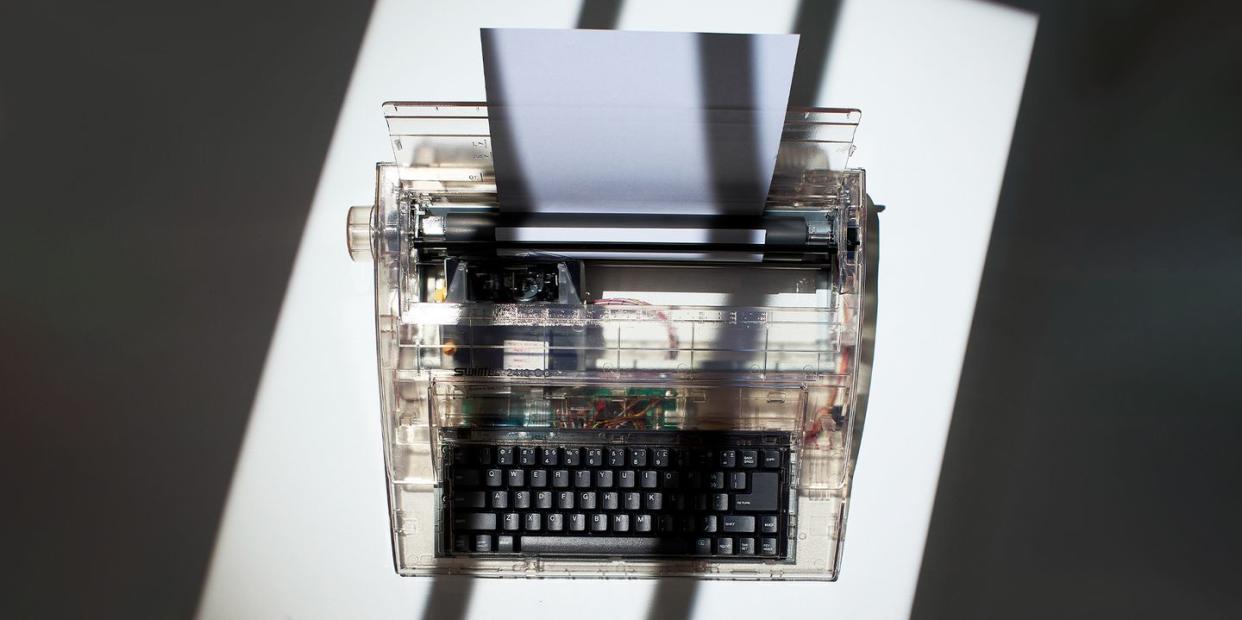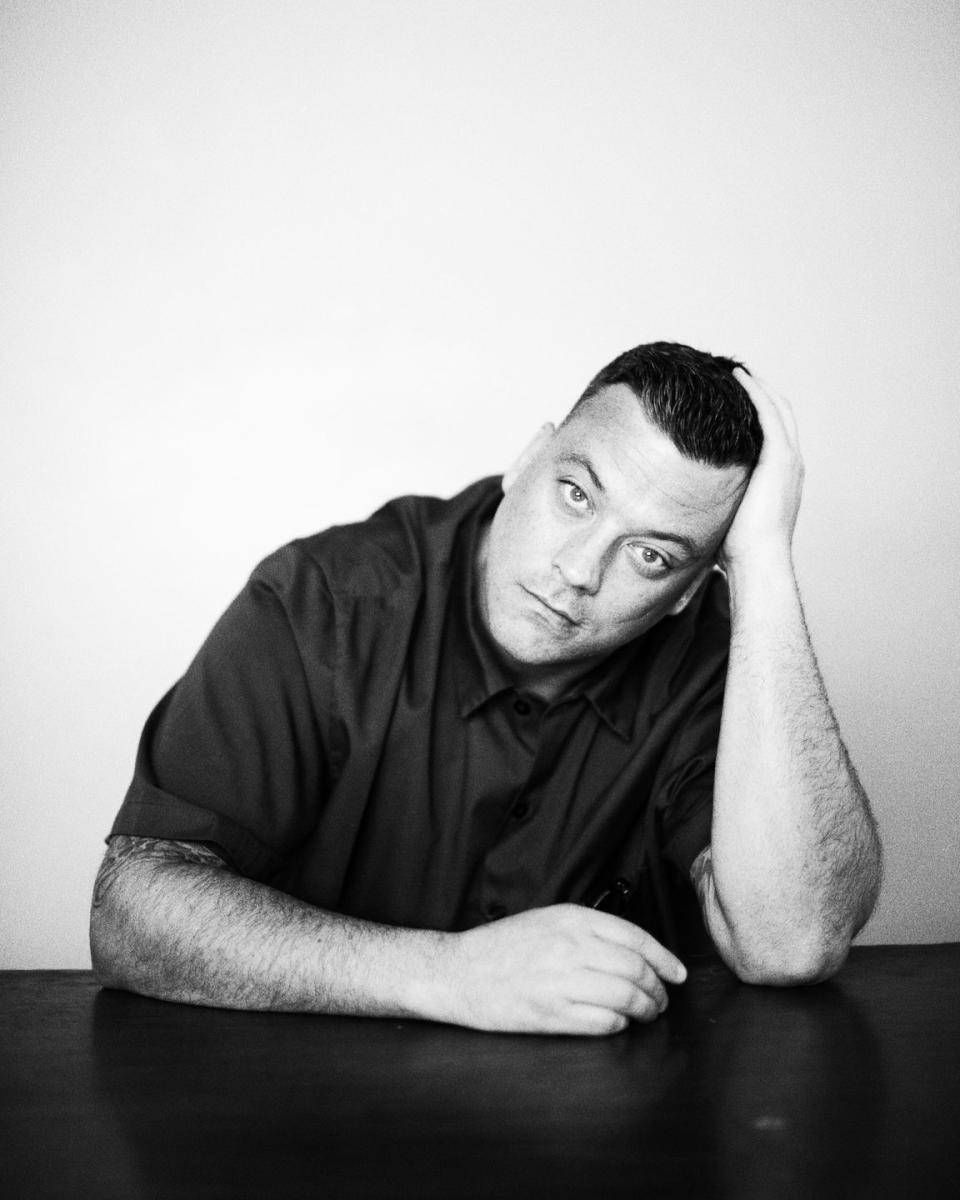The Shakedown at Sing Sing


I couldn’t tell whether Mr. Pink had a knife on him. Usually he did. It was an afternoon in July 2020, and the sun beamed down on Sing Sing, baking the B Block yard’s blacktop. By now the first wave of Covid, which had breached the prison in March and killed a guard and four prisoners, had mostly passed, and everyone was glad to be outside. I knew Mr. Pink had a beef with me. But since I’d moved to B Block several weeks earlier, he hadn’t made anything of it. Jogging along the perimeter fence capped with whorled razor wire, I glanced in my periphery at him and another grimy guy seated at a metal picnic table each time I passed. They were watching me, scheming. Looking to make a move.
I also knew Mr. Pink had manufactured his beef with me. A few years ago, my writing career took off, and everyone knew I was making money. Some guys were inspired, others were envious. But it was something more for Mr. Pink. (The name is a pseudonym; using his real name would violate the unwritten code of prison conduct.) I’d recently written for Sports Illustrated’s 2020 Super Bowl issue about prison’s sports-betting culture. Around the time the issue came out, Sing Sing guards raided the cell of the guy who was holding Mr. Pink’s stash—items that had nothing to do with gambling—and who happened to share the nickname of a character in my story. The guards confiscated the guy’s contraband and sent him to solitary. Mr. Pink, so I’d been told, held me responsible for his losses.
I finished my jog, and as I cooled down below a basketball rim with a half-moon backboard, Mr. Pink approached with his friend close behind and handed me a torn piece of paper. On it was written a name and a dollar amount. I had three days to transfer the money to that person’s account, he told me, or else we’d go “gun for gun.” Translation: We’d have a knife fight. He even offered to provide my weapon if I didn’t have one. So valiant, that Mr. Pink.
It didn’t matter to him that all the guys I’d included in the betting piece were not from B Block, where he, his stash man, and now I lived, but from A Block, where I’d been, and where my allies still resided. It didn’t matter that none of their cells had been searched. This was a poor attempt at Extortion 101—make the mark think he’s done something wrong, something only his money can make right.
Of course I wasn’t going to pay. But I couldn’t ignore Mr. Pink. One of prison’s ugliest paradoxes is that if you act violently, or even bluff violence—gesticulate and bass up your voice for what we call “the prison pump fake”—when tested, you earn more peace in the long run. Sometimes it’s hard even to know you’re being tested. In 2008, at Green Haven Correctional, in Stormville, I ran into a guy I knew from Brooklyn whose friend I’d killed. He told me he was not looking for payback, and I took him at his word. He sneaked me in the prison yard anyway, stabbing me six times in the chest and puncturing my lung. At least now Mr. Pink was letting me know straight up that we had a problem. He was not pump-faking. I had to do something.

I figured the next time my tier was let out into the yard before Mr. Pink’s, I’d wait just past the metal detector and approach him before he could get hold of a weapon. At first I’d pretend I was going to pay up, then plant, pivot, and swing a left hook squarely into his jaw. We’d rumble; guards would run over, mace us, cuff us. We’d receive misbehavior reports, lose privileges for a month. Our beef would be politicked throughout Sing Sing. I’d probably blow the deadline for my latest story and lose cred with my editor, but I’d be abiding by the prison code and preserving my dignity.
Then I realized: That’s what the old me would have done.
In 2001, at twenty-four, I killed a man on a street in Brooklyn for shaking down one of my drug dealers. I was sent up the river with a sentence of twenty-eight to life. Truth is, I grew up in the system. I’d done a year in juvy and another on Rikers Island, in a building called C-74 Adolescents at War. I’d quickly learned I had to act violently to survive. With each new beef, my fear would build until I popped. I couldn’t figure another way out. None of us could. Violence in prison occurred less often than it did in juvy and jail, but when it did, it was more serious. The first time I witnessed a shanking, in the yard at Clinton Correctional, in Dannemora, the guy who did it got away. The next morning, he strutted into the mess hall beaming, and everyone greeted him as a hero.
It’s hard to see that and not think, That’s what I must do to succeed in this place. It’s even harder to explain to your peers that you won’t engage because doing so might compromise something more meaningful in your life than following the prison code. You’ll be called weak, or worse. Who hasn’t faced that dilemma, whether you’re locked up or a free man, knowing what’s expected of you but not wanting to abide? Who among us has not grappled with restraint, or with the fear we’ll betray ourselves by making the wrong move? Most prisoners want to be known for more than the thing that landed them here, even if they don’t express it—to be known as more than just a criminal. But it’s hard to be vulnerable in this environment. Talk about toxic masculinity.
As I got older, I grew less impulsive and more contemplative. In 2010, while at Attica, I joined a creative-writing workshop and took to my own, on-the-ground style of prison journalism. I started cold-pitching ideas to magazines; short assignments led to longer ones and then to features in national publications. With each new piece, I engaged less with the daily ups and downs of prison’s social order. My career has improved my life in all sorts of ways; it has laid the tracks for my return to the real world, one I was never a part of as a free man.

But my career has also complicated my life in prison. During a recent radio interview about my writing process, I said my edge over other journalists was my “unlimited access to colorful characters.” Fellow prisoners heard it on the radio, and some were offended. Steve, a talented, published writer in his own right, reminded me that while I may see the world through scene and character, those characters are real people, and I have a responsibility to take care with how I depict them and their actions. “They’re still your neighbors,” Steve said. Another pal of mine, a charismatic mobster in his late fifties, advised me to “work the crowd more. Give guys some of your time.” If I didn’t, he said, “they’re gonna look for reasons to resent you.”
He was right. I should have better worked the B Block crowd. Had I gotten out of my head and turned on my personality, Mr. Pink would have seen I had support and might never have moved on me.
I thought of nonviolent ways out of the situation. If I could get back with my allies on A Block—older guys, thinkers—they’d help de-escalate the beef. I knew I couldn’t go to Sing Sing’s superintendent; let’s just say he wasn’t a fan of my reporting. But I didn’t need him. By now I had a network of contacts and people in my corner. I called a colleague and told him what was happening. He in turn reached out to the spokesperson for New York’s Department of Corrections, who knew me well from all the times publications had reached out for comment on my articles, and explained the situation. Soon after, security escorted me, against my wishes, to an involuntary protection unit.
The next day, I was brought to a sweltering interview room to talk to a man from the department’s Office of Special Investigations. In order to help me get off B Block, he said, he needed names. I told him I wouldn’t provide them. In that case, he said, I’d be involuntarily kept on a protection unit—which, having spent nine months on one after I got stabbed and wouldn’t name my attacker, I can say is pretty horrible—because he couldn’t protect me if he didn’t know my enemies. If he did that, I said, I’d make a lot of noise.
I imagine that to most readers, what I said and did not say to the investigator comes across as following the prison code. I assure you that prisoners who read this will feel I broke it. This is the high-wire conundrum I walk every time my words appear in print.
If he couldn’t get me back to A Block, the investigator asked, where else would I want to go? Two days later, I was bumping around the back of a corrections van with tinted windows, shackled and cuffed and chained, heading to Sullivan Correctional Facility, a small maximum-security prison in the southern Catskills. As people in cars and homes flashed by, I wondered about their lives, and whether they’d read any of my stories about our lives.
Sullivan, known for housing high-profile convicts and prisoners with special needs, has been my home for more than a year. I miss my friends on A Block, and sometimes I even miss Sing Sing. But I have no regrets.
When I told my mobster friend here that I was working on this piece, he couldn’t understand why I would dredge up the story of how I wound up here. Wouldn’t that create more complications, make my life harder? He said cracking Mr. Pink would have been the simpler solution. Maybe so. But just because I avoid confrontation in prison doesn’t mean I avoid it on the page. I still have my edge, but I’ve learned to channel it into my work.
I was reminded of how I’d left off with the special investigator. Why, he’d asked, had I written that Sports Illustrated story in the first place?
“Because I took a fucking shot,” I’d replied. “That’s why!”
You Might Also Like

